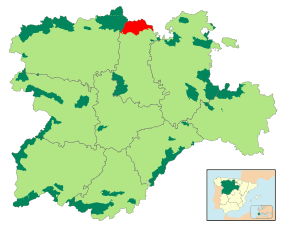Natural Park of Fuentes Carrionas y Fuente Cobre-Montaña Palentina
| Natural Park of Fuentes Carrionas and Fuente Cobre-Montaña Palentina | |
|---|---|
|
IUCN category V (protected landscape/seascape)
|
|

The landscape of the park show the effects of glaciation in the last glacial period.
|
|

Location of the natural park within Castile and León
|
|
| Coordinates | 42°56′N 4°35′W / 42.94°N 4.58°WCoordinates: 42°56′N 4°35′W / 42.94°N 4.58°W |
| Area | 78,360 ha (193,600 acres) |
| Visitors | 21179 (in 2007) |
| Governing body | Junta de Castilla y Léon |
Fuentes Carrionas y Fuente Cobre-Montaña Palentina is a natural park in the north of the province of Palencia in Castile and León, Spain.
The park was declared in 2000 and is one of a number of protected areas in the Cantabrian Mountains. The name of the park refers to the Fuentes Carrionas sub-range (source of the river Carrión) and to Fuente Cobre (the traditional source of the river Pisuerga). From an ecological point of view, most of the park is within the Atlantic biogeographical region, but it is on the edge of that region and 4% of the area is classed as Mediterranean.
In 1998 the natural park was proposed as a Site of Community Importance. In 2000 It was designated a Special Protection Area (SPA) for bird-life (reference number ES4140011) under the European Union's Birds Directive. In 2015 it was designated a Special Area of Conservation (SAC) under the Habitats Directive.
The Cantabrian Capercaillie became extinct in the natural park at the beginning of the twenty-first century. Since 2010 the European Union's LIFE programme has supported a recovery plan for this subspecies, "Urgent measures scheme for the conservation of the capercaillie (Tetrao urogallus cantabricus) and its habitat in the Cantabrian mountains". This project was scheduled to run until 2014 across SPAs and Biosphere reserves in the region, and the natural park has been identified as a suitable site for the bird's reintroduction.
...
Wikipedia
